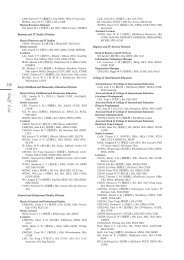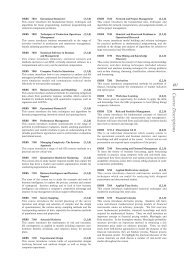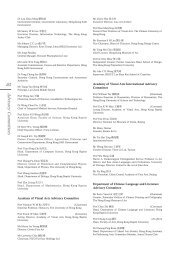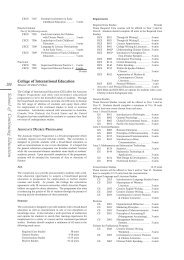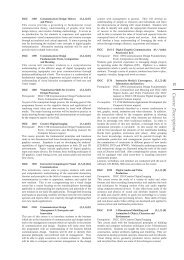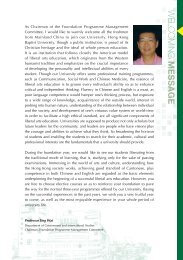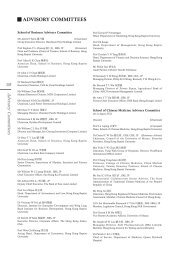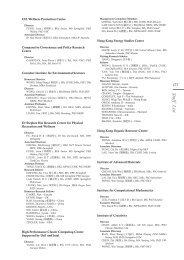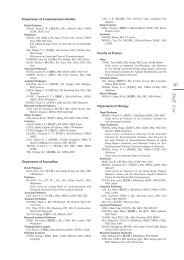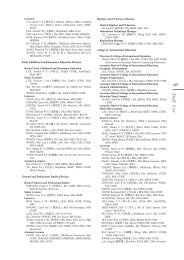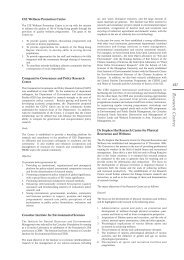368<strong>Course</strong> <strong>Descriptions</strong>GDCV 1096 Seeing through Glass: How It (3,3,0) (E)Creates Our WorldGlass is one of the most influential materials in humancivilization. Glass has been a medium widely used in oureveryday life since its discovery by the Phoenician merchantsin the region of Syria in 5,000 BC. It is not only in the makingof daily use objects such as bottles, mirrors and light bulbs, butalso in the production of advanced technological articles liketelescopes and microscopes. We simply cannot live without glass;glass helps us to see the world beyond our visual limitation.This course aims to examine the importance of glass from variouspoints of view, from history, culture, science, religion, everydaylife and art appreciation, as a way to make students aware of theinseparable relation between glass and human civilization. Inaddition, through the discussion of the functional and spiritualimplication of glass, its aesthetics and scientific values, and itsartistic qualities in forms of jewellery or architecture, studentswill be able to see glass in a wider spectrum. Whilst the course isnot intended to provide professional training in glass making, anumber of hands-on projects will enable students to have a betterknowledge on how glass changes, shapes and creates our world.GDCV 1097 Show Off the Art: Value and (3,3,0) (E)DesireThis course will investigate the interaction between artist’sstudio, commercial gallery and museum within the context ofcontemporary culture. Examining the history of exhibition, andthe effect and impacts of the commercial art markets, this courseconsiders what art means to us, how art makes a different toour public life, and what it would tell us about our society. Thiscourse will assess the contrasts and similarities of the public andprivate sectors of art consumption and reflect upon who and whatwould determine the aesthetic significance and monetary valueof art. It also considers the changing notions of art exhibition interms of traditional associations of status, education and evaluatethe roles of gallery, dealer, auction house and buyer as the centrepin to driving and responding to market forces.GDCV 1105 Space-saving Creative Practising (3,3,0) (E)With emphasis on both experimental and practical concepts, thispractice-based course offers students an entry point to creativedesign and problem-solving skills associated with space. Throughexamining space-saving objects, students will learn the conceptof collapsibility and present collapsibility principles. Moreover,students will learn the spatial meanings of peripheral alternativespace in <strong>Hong</strong> <strong>Kong</strong> through their creative projects. Relatedglobal classic creativities, Swiss folding knives for instance, will betopics to illustrate the relationship between geographic space andthe culture of tools.GDCV 1106 Product Design Basics (3,3,0) (E)This course looks at the things surrounding us in our dailylives, and—through practical application of aesthetical,phenomenological and other design theories—establishesconcepts about the true nature(s) of things that allow us tomake more informed choices about the objects that we fill ourlives with. Emphasis will be on product design, but will alsomake connections to furniture and fashion design, and otherobject-based design areas. It also contains a significant numberof practical studio classes that allow participants to hands-onexperience and explore what it takes to make things “beautiful”.GDCV 1107 Creativity and Chinese Painting (3,3,0) (E)This is a studio-based course on Chinese painting, which isalso known as national painting or ink painting. Students willfamiliarise themselves with basic techniques and critical conceptsin practical way. Focusing on xieyi style (or freehand style), thiscourse aims to introduce students the methods of executingChinese brush, ways of modeling forms in effective and efficientway, appreciation and interpretation of common subjects inChinese painting, and implementation of artistic ideas throughthe process of painting. Museum, gallery or artist-studio visit(s)will be organised. No prior knowledge of Chinese art and cultureis required.The course will discuss visual examples from the tenth century ofImperial China to the twentieth century of the Republican Era.Each course participant would study in depth the styles and themodes of expression developed by a selected group of old masters.In addition to stylistic and aesthetic analysis on paintings, thecourse will stress the students’ own artistic development andexpression.GDCV 1115 Understanding Photography (3,3,0) (E)In this course, students will be introduced to early technologiesof seeing from the camera obscura all the way through to Flickr,together with concepts and ideas of light, or reproduction andcirculation of imagery, and the techniques used to produceparticular effects and emotional responses. The various waysof photographic production enable students to understand notonly the making process but to express their own thoughts inviewing the objective world. The course will include workshopsin experimental photo-practice, for example, using mobilephone cameras to create artistic imagery. The assessable output(photographs, interpretative texts) will be presented in anexhibition.GDCV 1116 Wear Me (3,3,0) (E)Human kind has a long history of body ornamentation. From themore permanent body modifications like tattoos and piercings,to temporary ones like makeup, body painting, hairstyling andcolouring, to wearable objects like jewellery, accessory, clothing,and other personal possessions, the varieties are endless. Bodyornamentation has its practical and functional values, andfurthermore it reflects cultural values like the aesthetics and ethicsof a society. At the same time, body ornament is a means forindividuals to publicly showcase one’s attitude and style. As wemove about in the public, our body becomes a mobile exhibitionplatform.This course uses wearable objects, like clothing and accessories, toexplore the possibility of utilizing these objects for the expressionof ones stance and believes. We will use various materials andfabrication methods to create and transform wearable objects. Wewill also investigate the differences between two manufacturingprocesses: Do-it-yourself and mass production, thus creating anarc between craft and design.GDCV 1816 Interactive Computing for Visual (3,3,0) (E)CommunicationMedia convergence has transformed the computational machineinto an unprecedented rich multimedia communication mediumwith ubiquitous connectively and interactive capability. Thisnew medium presents endless possibilities with applications fullof dynamic contents and rich visual user interface experience.Expertise in both computer science and visual communication areneeded in order to fulfil the application demands.This course aims to address these demands and prepare thestudents with all-around trainings and skills to master thechallenges. Unlike traditional courses which are merely designedfor one specific discipline of students, this course offers a uniqueplatform for students without any prerequisites in mathematics,computer programming or visual design to acquire and establishthe knowledge necessarily for the challenges.This course introduce high-level programming concepts andapproaches visual design on the new medium using approachableand intuitive computational visual building block environmentsuch as Processing developed by MIT.GDCV 1825 Religious Creativity and (3,2,1) (E)Visual ArtsThis course aims at exploring diverse religious traditions, beliefsand values through visual language of artworks. Investigating avariety of artworks including sculptures, paintings, manuscripts,architecture and interior designs, it encourages students toexamine notions of good and evil, values and belief systems,relationship between human and divine world, and religiousengagements and rituals. Integrating art and cultural history andreligious thinking, this course considers artworks as visual agents
of various religions that broaden the conventional realms ofaesthetics and create profound religious experiences.GDCV 1826 Seeing the World from Scientific (3,3,0) (E)and Artistic PerspectivesThe course will give students a well-rounded and advancedapproach towards arts and science. The course will be taughtby a team of artists and scientists from both faculties. It willcover topics on the development of art forms from a historicalperspective that have a distinct relationship with the advancementof science. Examples of integration between artistic inspirationand scientific knowledge will be illustrated.GDCV 1827 Understanding East Asian (3,2,1)Transformation through FilmsThe course will examine the epochal transformations of East Asiaas a whole region since the end of World War II. Its profoundmultidimensional transformations in economic, technological,political, social and cultural fields, as stimulating and powerfulvenues, will be discussed. Each important film selected for studywould be an occasion for the students to learn the ideas input bythe film artists who produced these films. The students wouldbe led to appreciate the artistic expressions, the humanisticand ethical concern, and the joy and tears of professional andinnovative filmmakers.GDCV 1837 When West Meets East: Modernity (3,3,0) (E)in the ArtsThis course aims to extend students’ knowledge and experiencebeyond their major study by exploring the Modernist art formsin Western culture, including visual arts, music and literature.Modernity and its theories are culturally specific concepts, and arenonetheless relevant to social-cultural conditions of the twentiethfirstcentury, the Modernist art forms derived a century ago are ofartistic and scholarly value.By examining key concepts and works of arts, students of differentmajor(s) will be able to understand the current world conditionwith references to what had happened and had been happening inthe past.The case study on Chinoiserie, including visual arts and opera,invite students to look closer to modernity and cultural influencein varying perspectives. Opera, once a popular art form,invites fresh insight of students of the 21st century as well asspectatorship and directorship like Zheng Yi-mou. It is expectedthat the course would allow students to link the past to the present,and learn to recontextualise the existing art forms of <strong>Hong</strong> <strong>Kong</strong>and the Anglophone, as the former is often considered at thecrossroads of East and West.GDCV 1845 Videogames and Arts (3,3,0) (E)The course aims to provide an introduction to the study of games,videogames as an art form in particular, as well as understandinggames as a business, a cultural phenomenon and technologicalinvention. The game design process will be introduced as a wayto enhance problem solving skills and creativity. Students will berequired to design a new game using the principles learnt in classand at the same time to address social issues that related to theireveryday life experience.In the course, students will learn about gaming theory (Iudology)and the ways it apples to videogames, and as well as the fields ofart, business and technology about videogames. Audio and visualelements in videogames are obvious creative content. Game ingeneral is also a popular medium and strategy in contemporaryart production, since 1960s. Interactive art and design in thedigital era often displays game like characteristics. The study ofvideogames in the art context will provide students an alternativeperspective to understand the gaming experience they are familiarwith, and to encourage inter-disciplinary thinking.The course covers the aesthetics of games in the areas ofgenres, graphics, storytelling, gaming theory, interactivity, andcontemporary social issues. Upon completion of the courses,students will be prepared to reflect upon their own daily gamingpractices from more critical and creative perspectives.GDCV 1856 How Ideas Spread (3,3,0) (E)This course explores cultural propagation of ideas from aninterdisciplinary perspective that includes communicationstudies, anthropology, psychology, sociology, and marketing. Itcomprehensively, yet succinctly, examine what gets propagated(nature of popularly propagated ideas), who are involved inpropagating (opinion leaders, early adopters, etc.), when culturalpropagation arises (circumstances leading to the generation andspread of ideas), where ideas are spread (social networks, onlinecommunities, etc.), why individuals propagate ideas (motives,goals, and desires), and how ideas are propagated (modes oftransmission).GDCV 1875 Uncovering the Stories of Brands (3,2,1)The objective of this course aims to motivate students tothink critically on diverse cultural and social issues. Thiscourse introduces students to the interplay of brands andperceptions in our daily lives. Emphasis is placed on studyingthe interwoven relationships among brands communication,society and consumers. The course aims to expand students' historical, social, economic and cultural perspectives. Throughdifferent theories and case studies, students will have a deeperunderstanding of how brands play a significant role in our socialand identity transfonnation. Students are also able to research,analyze, integrate and criticize various brands stories and socialdevelopment, and further apply the knowledge to their study andprofessional development.GDSC 1005 Environmental Principles and (3,3,0) (E)Contemporary Environmental IssuesThis course intends to enhance students’ understanding onfundamental environmental principles and environmentalethical principles as well as to foster their critical thinking onenvironment-related issues. Specific issues covered in the coursewill include resources management, food safety, public health,sustainable development, ecotourism, nature conservation andecological footprint. In order to better illustrate these core issuesand their implications on policy making and application of ethicalprinciples, relevant current environmental issues in <strong>Hong</strong> <strong>Kong</strong>,China and other countries will be cited as discussion examples.GDSC 1006 You and Your Environment (3,3,0) (E)This course aims to introduce to students the principles and issuesof environmental science. The topics selected will demonstratehow human activities cause environmental problems and whatconcepts and technologies can be applied to solve these problems.GDSC 1007 You and Your Health (3,3,0) (E)This is an introductory course to students on the basics of humanbody and how factors from the living environment may affect ourhealth. Topics chosen are closely related to health and diseases.Specific health problems and issues of interest will be selected fordiscussion.GDSC 1015 Coffee with Profs—The (3,3,0) (E)Fascinating Science of Everyday LifeDesigned for non-science majors, the course aims to demonstrate,through daily life examples, the many important contributionsand relevance of science and technology in modern living. Thecourse will start with discussion on myths and facts of coffee,physiological effect of caffeine, to organic farming, fair trade,globalization (coffee shop industry) and golcalization (inventionof Yuenyeung [coffee with tea] at <strong>Hong</strong> <strong>Kong</strong> cafes). Connectionsbetween modern science inventions and individual’s healthy livingstyles (home/food/travel/shopping, etc.) will also be discussed.Controversial socio-scientific issues will be used to rectify students’misconceptions in science concepts.369<strong>Course</strong> <strong>Descriptions</strong>
- Page 3 and 4:
economic growth, trade, pollution,
- Page 5 and 6:
specific empirical economic problem
- Page 7 and 8:
of private enterprises in the indus
- Page 9 and 10:
period. The first part of the cours
- Page 11 and 12:
The reactions and effectiveness of
- Page 14:
314Course DescriptionsEDUC 3080 Tea
- Page 17 and 18: development of children and adolesc
- Page 19 and 20: and communication skills in differe
- Page 21 and 22: y ubiquitous technology. Learners w
- Page 23 and 24: ENG 2650 Topics in English Grammar
- Page 25 and 26: clause structures of the English la
- Page 27 and 28: adopted for reading and interpretin
- Page 29 and 30: drama; and (2) introduce Western dr
- Page 31 and 32: ENGL 4005 Advanced Topic in Compara
- Page 33 and 34: attendant to the break-up of mediev
- Page 35 and 36: EURO 3205 Comparative Politics of (
- Page 37 and 38: states, enlargement provides signif
- Page 39 and 40: to create and develop ideas via rel
- Page 41 and 42: strategies of awarded campaigns to
- Page 43 and 44: characteristics of films, film-make
- Page 46: 346Course DescriptionsFINE 1005 Fin
- Page 49 and 50: GCHC 1005 China and the Global Econ
- Page 51 and 52: the period with a special focus on
- Page 53 and 54: est decision-making procedures. Mor
- Page 55 and 56: GCPE 1065 Table Tennis (1,2,0) (C)T
- Page 57 and 58: and/or philosophical traditions the
- Page 59 and 60: on the use of English in various se
- Page 61 and 62: GDAR 1835 Music, Mind, and Human (3
- Page 63 and 64: lead to successful development of n
- Page 65 and 66: management and proactive stakeholde
- Page 67: GDCV 1065 Buildings of Hong Kong: (
- Page 71 and 72: their implications for contemporary
- Page 73 and 74: gone through since 1945 included th
- Page 75 and 76: GEOG 1005 Geography and the Contemp
- Page 77 and 78: students to the concepts and techni
- Page 79 and 80: GEOG 3730 Energy Policy and Analysi
- Page 81 and 82: processes interact with China’s s
- Page 83 and 84: GERM 1006 German II (3,3,0) (G)Prer



